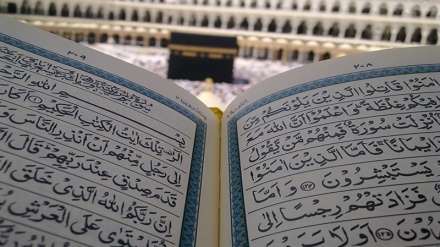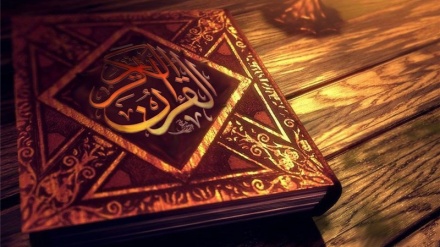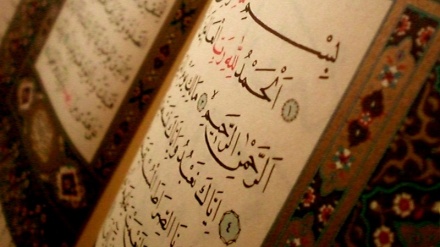Path towards Enlightenment (1030)
Welcome to our latest episode of “Path towards Enlightenment”, which is an endeavour to make you and us familiar with an easy and fluent explanation of God’s Final Scripture to all mankind, the holy Qur’an that was revealed to the Last and Greatest of all Messengers, Prophet Mohammad (blessings of God upon him and his progeny).
In our previous episode we completed explanation of “Surah Qalam” and today we take up explanation of the next Surah, that is, “Surah Haqqah” – the number 69 in the serial order of compilation of the holy Qur’an.
Revealed in Mecca, it has 52 Ayahs and opens by proclaiming one of the names of the Day of Resurrection, that is, al-Haqqah or The Inevitable Reality, so named because the matter of truth in every affair shall forever be decided on Judgement Day. It describes punishment in the transient life of the mortal world for disbelievers as well as the more terrible fate that awaits them in the Hereafter. The bliss to be enjoyed by the believers is eloquently contrasted with the torments of hell for the disbelievers. The truth of the Holy Qur’an and the Prophet of Islam is also confirmed. The Surah is also known as The Concrete Reality, The Catastrophe, The Indubitable, The Inevitable Hour, The Sure Occurrence, and The Undeniable
It is narrated from the Prophet that recitation of Surah Haqqah lessens the burden of sins. It is narrated from Imam Mohammad Baqer (AS), the Prophet’s 5th Infallible Heir, that it is incumbent to recite this Surah many a time, since its recitation in the ritual obligatory and supererogatory prayers serves as a token of belief in God Almighty and His Messenger; and whoever recites it, his/her faith shall remain intact until Resurrection provided that religious obligations are fulfilled.
Now let us listen to Ayahs 1, 2, 3, 4, and 5:
“In the Name of Allah the Compassionate the Merciful – “The Inevitable (Day)”
“What is the Inevitable?!
“And what will show you what is the Inevitable?!
“(the nations of) Thamoud and Aad denied the Catastrophe.
“As for Thamoud, they were destroyed by the Cry.”
As we said the Arabic word “al-Haqqah” which means the Inevitable or the Catastrophe that will definitely occur is a designation of the Day of Resurrection, which is indeed the Undeniable Reality. Ayahs 2 and 3 lay further emphasis on the horrific events to happen on that Great Day – for the people who denied the Day of Resurrection.
The next Ayah refers to the Divine Wrath that struck the disbelieving and sinful pre-historic nations of Thamoud and Aad which used to belie the prophets sent by God to guide them, and after a long respite given to them by the All-Merciful Lord were struck by destructive Divine torments. The nation of Thamoud inhabited a mountainous region between Hijaz and Syria in Arabia. God Almighty appointed Prophet Saleh to guide them to the right path, but they rejected his call, rose against him and even mockingly asked him to send down the promised torment if he was true in his Prophetic Call. Then, as their sins transgressed all limits, a destructive lightning struck them. Their firmly built palaces and mansions trembled in a few moments and were destroyed, while their dead bodies were cast on the ground.
From these Ayahs we learn that:
- The Day of Resurrection is inevitable and its horrific occurrences are beyond our limited understanding.
- Divine wrath also occurs in the transient life of the mortal world for those who have exceeded all limits of disbelief and sins, never bothering to repent.
- The fate of the sinful nations of the past should serve as a lesson for us.
Now let us listen to Ayahs 6, 7, and 8 of the same Surah:
“And as for Aad, they were destroyed by a fierce icy gale,
“Which He (God Almighty) imposed upon them for seven nights and eight days; so that you could have seen the people lying about therein prostrate, as if they were hollow trunks of palm trees.
“So do you see any trace of them?”
These Ayahs refer to the dire fate of the nation of Aad which inhabited the land of Ahqaaf in Yemen and the southern part of the Arabian Peninsula. They were tall of stature and robust and had verdant lands and fertile gardens. God appointed Prophet Houd to guide them but they refused to heed his call and as a result of their disbelief and sinful life they were struck by Divine Wrath after the ample respite given to them from the All-Merciful Lord. For seven nights and eight days consecutively an icy gale raged and shattered their prosperous habitations, reducing such arrogant people to rotten corpses that resembled hollow trunks of palm trees. There is no trace of the people of Aad and the ruins of their prosperous habitations, majestic edifices, and fertile farms.
These Ayahs teach us the following points:
- Natural phenomena, like wind and rain, are Divine blessings in normal conditions. But, as per Divine Will, they can turn into the means of destruction for the disbelievers and habitual sinners.
- One should never boast or feel proud of physical strength and ability, since human beings are nothing vis-à-vis Divine Power.
In conclusion of this week’s episode of Path towards Enlightenment, we listen to Ayahs 9, 10, 11, and 12 of Surah Haqqah:
“And Pharaoh and those who were before him; and the towns that were overturned (i.e. of the people of Prophet Lot) for their habitual sins;
“Then they disobeyed the Prophet of their Lord, se He seized them with a terrible seizing.
“Indeed when the Flood rose high, We carried you in a floating ark,
“That We might make it a reminder for you, and that receptive ears might remember it.”
These Ayahs mention the fate of rebellious persons, such as Pharaoh, Nimrod and the peoples to whom God had sent Prophet Lot and centuries before him, Prophet Noah for guidance, but the people and their rulers continued to commit grave sins, without the least remorse. Ayah 10 means to say that when they rejected and mocked the Prophets and even plotted to kill them, God Almighty inflicted them with a severe torment in the form of drowning in the sea, as is evident by the fate of Pharaoh and his people who refused to heed the call of Prophet Moses and Aaron (peace upon them).
The inhabitants of Sodom and Gomorrah used to indulge in the abominable sin of same gender sexual relations, that is, sodomy, and were destroyed by a hail of stones falling upon them from above.
Ayah 11 refers to the great deluge that flooded all the lands as a result of the rise of river waters accompanied by heavy downpour from the skies, to the extent that God commanded Prophet Noah to board the Ark that he was building all these years along with the few believers, as well as a pair of all animals and birds. Thus, everything was drowned, the gardens, farms, palaces, and the mansions of the disobedient people. The believers were only saved by embarking upon the Ark with Prophet Noah. In other words, God Almighty never willed to take vengeance, but the goal behind their being inflicted with torments is to lead people on the path of spiritual growth such that they tread the path of development and perfection and attainment to union with the desired object.
The last Ayah emphasizes the importance of ears to listen, heed the words of truth and to preserve them in memory, rather than hearing from one ear and allowing it to pass through the other, that is, deliberate negligence and forgetfulness. The believers are reminded to make their ears receptive to the all events and to preserve the accounts of the past nations.
These Ayahs teach us that:
- Disobedience of prophets is equal to disobedience of Allah and it will result in a painful punishment.
- Allah never punishes a nation before sending prophets for guidance in order to explain to them the truth and sealing them the argumentation.
- Studying the accounts of the predecessors is useful.
RM/AS/SS


